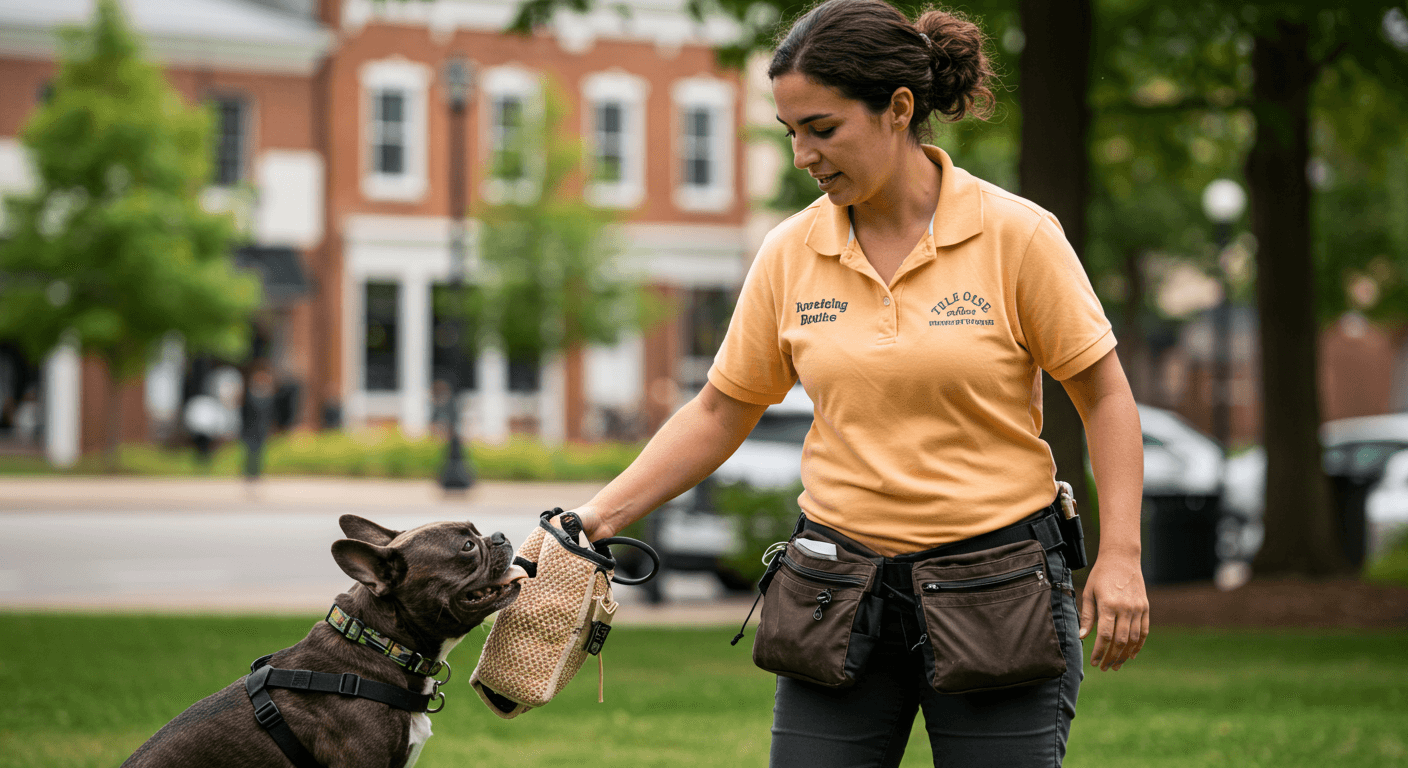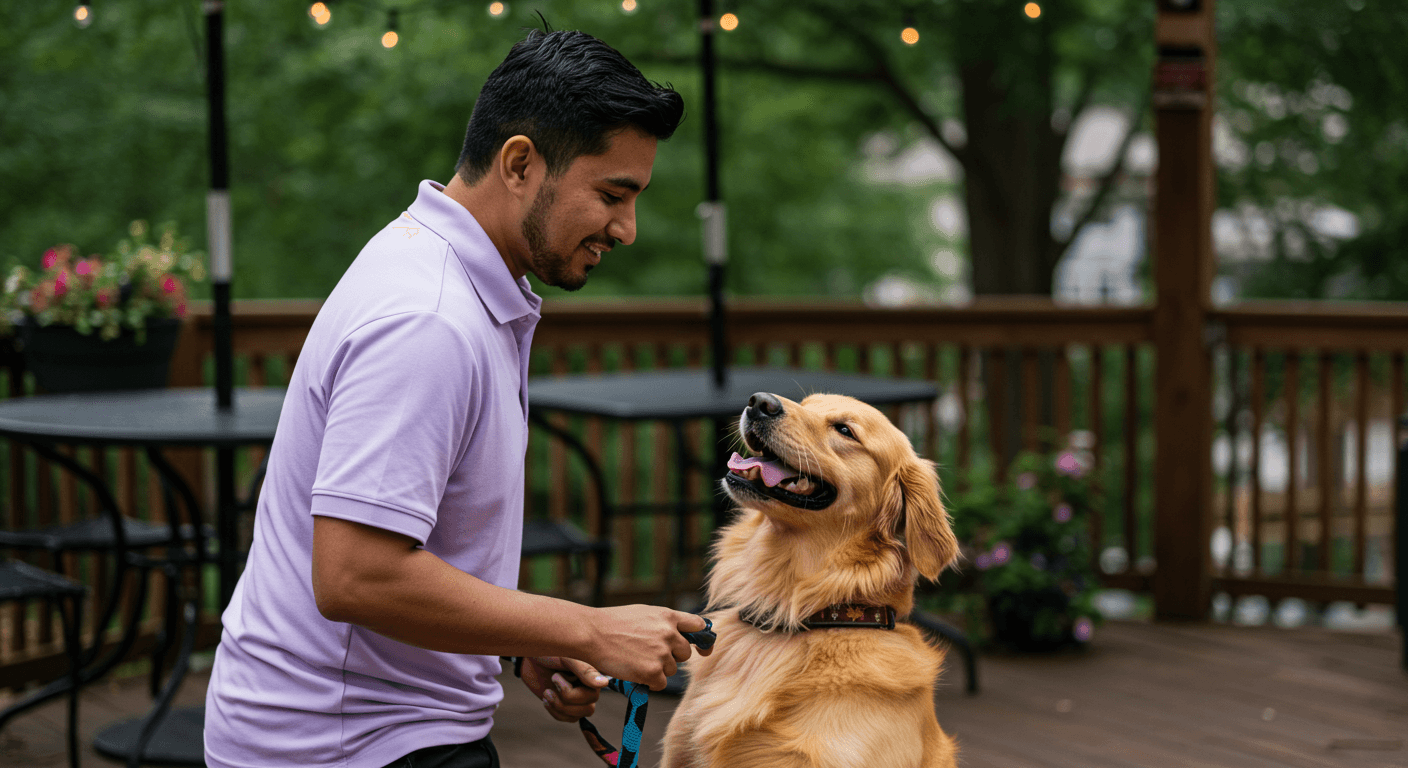Your Complete Guide to Choosing a Dog Trainer in Tennessee
Tennessee presents unique opportunities and challenges for dog owners. From the busy streets of Nashville to the mountain trails near Gatlinburg, your dog needs solid skills to handle everything the Volunteer State offers. Whether you’re navigating city parks in Memphis, exploring the greenways around Knoxville, or enjoying small-town life in Murfreesboro, finding the right professional dog trainer makes all the difference.
Tennessee doesn’t require state licensing for dog trainers, but that means you’ll need to do your homework to find someone who uses effective, humane methods and understands local regulations. The right training program helps your dog become a well-behaved companion at home and in public spaces throughout the state.
How to Choose the Right Trainer
Start by looking for someone who uses positive reinforcement training methods and can tailor their approach to your specific needs. Your dog’s training should prepare them for real Tennessee life, whether that means staying calm at outdoor music venues, walking politely through crowded farmers markets, or maintaining focus near livestock on rural trails.
Credentials give you a reliable way to evaluate a trainer’s education and commitment to professional standards. Look for dog trainer certifications like CPDT-KA, KPA-CTP, or IAABC-CDBC for behavior concerns. If your dog shows serious aggression or anxiety, ask if the trainer holds a CBCC-KA credential or has completed programs like CTC.
In-home dog training works well for addressing problems where they actually happen, like door manners, yard reactivity, or separation anxiety. Group classes make sense once your dog has basic focus skills, and they offer valuable socialization practice. Private lessons give you flexibility to work on specific goals, while board and train programs can accelerate progress if your schedule is packed.
Ask about free consultation options to meet the trainer, discuss your goals, and see if their style matches what you need. Expert dog trainers will explain their methods clearly and help you understand what to expect from training sessions.
Common Dog Training Methods Explained

Positive reinforcement builds trust while teaching your dog exactly what you want them to do. This approach works faster and lasts longer than methods that rely on fear or discomfort, and it helps you comply with local animal control expectations about keeping dogs under control.
Basic obedience covers sit, down, stay, come, place, and leash training so your dog can handle everyday situations without pulling, jumping, or ignoring you. These foundational skills make every outing easier, from trips to the vet to visits at pet-friendly restaurants.
Puppy training focuses on socialization, potty training, bite inhibition, crate comfort, and early manners. Starting young prevents problems from developing and sets up puppies for success in Tennessee’s varied environments. Puppy classes also help young dogs learn to stay calm around other dogs and new people.
Behavior modification addresses issues like reactivity, fear, resource guarding, and separation anxiety through careful desensitization and counterconditioning. For serious behavioral concerns, look for trainers who coordinate with veterinary professionals and have experience with complex cases.
Dog training classes typically run for four to eight weeks and teach both you and your dog new skills in a structured environment. The best group classes keep dogs at a comfortable distance from each other and emphasize calm behavior rather than excitement.
Specialized training like service dog training or therapy dog training requires additional structure, public access skills, and clear performance standards. These programs demand more time and consistency than basic obedience work.
Avoid trainers who use intimidation, physical corrections, or tools designed to cause discomfort. Humane training methods protect your relationship with your dog and create lasting behavior changes without damaging trust.
Average Cost of Dog Training in Tennessee (Updated for 2025)
Pricing across Tennessee varies based on the trainer’s experience, location, session length, and training format. Urban areas like Nashville, Memphis, and Knoxville typically run higher than rural regions, but you’ll find quality dog training services at every price point.
| Service Type | Average Cost (Tennessee) |
|---|---|
| Puppy classes (4-6 weeks) | $125-$250 total |
| Group obedience classes (4-6 weeks) | $140-$275 total |
| Private lessons (60-90 min) | $90-$175 per session |
| In-home training packages (4-6 visits) | $380-$850 total |
| Day training (trainer works your dog + handoff) | $400-$900 per week |
| Behavior consultation (initial session) | $125-$225 |
| Board and train (2-4 weeks) | $1,800-$4,200 total |
Rural areas and smaller towns generally see prices on the lower end of these ranges, while major metro areas trend higher. Expect additional travel fees if you’re located far from the trainer’s base, and plan on higher rates for aggressive dog training or complex behavior modification work.
Make sure you understand what’s included in the quoted price, how progress will be measured, and what follow-up support the trainer provides after the initial training program ends.
Questions to Ask a Potential Dog Trainer
- What training methods do you use, and how do you keep sessions positive and low-stress for my dog?
- What certifications do you hold, like CPDT-KSA or other recognized credentials?
- How will you customize your approach for my dog’s specific needs and our lifestyle in Tennessee?
- Do you offer in-home sessions, group classes, or day training, and which format fits my goals best?
- How will we measure progress and know when my dog is ready for more challenging environments?
- What are the total costs, including any travel fees within your service area, and what’s your cancellation policy?
- Do you carry liability insurance for your dog training services?
- For behavior problems, will you work with my veterinarian or a veterinary behaviorist if needed?
- What should I practice between sessions to help my dog improve faster?
- Can you provide references from clients with similar training goals?
Tennessee Considerations for Dog Owners
Tennessee’s statewide laws and local ordinances work together to keep public spaces safe for everyone. Understanding these rules helps you train your dog to meet legal expectations while being a good neighbor.
Tennessee Code Annotated requires that all dogs over three months old be vaccinated against rabies and wear a current rabies tag. You can get vaccinations through your veterinarian or county health department clinics. Individual counties handle enforcement and maintain rabies records.
Leash laws vary by city and county across Tennessee. Most municipalities require leashes in public areas, typically six feet or shorter, except in designated off-leash zones. Nashville, Memphis, Knoxville, Chattanooga, and most other cities enforce strict leash requirements in parks, greenways, and public spaces.
Nuisance barking ordinances exist in nearly every Tennessee city. If your dog barks excessively, you could face complaints and fines, so work on this issue early with your trainer. Many behavior modification programs include protocols for reducing alert barking and separation anxiety.
Tennessee has no state-level licensing requirements for dog trainers. However, if a trainer operates a boarding facility as part of their board and train program, they may need to follow county health and business regulations. Always ask to see proof of liability insurance before beginning any training program.
Some Tennessee cities require dog licenses or registration through local animal control. Check with your city or county animal services to understand local requirements for your area.
Local Tennessee Resources for Dog Owners
Tennessee offers numerous places to practice your dog’s new skills while providing exercise and enrichment. Always follow posted rules and local etiquette guidelines at these locations.
- Shelby Farms Dog Park in Memphis features separate areas for large and small dogs with plenty of space for recall practice and socialization
- Warner Park Dog Park in Nashville offers fenced areas where dogs can practice off-leash skills in a safe environment
- South Knoxville Dog Park provides secure fencing and water stations for training sessions during less crowded hours
- Percy Warner Park in Nashville welcomes leashed dogs on scenic trails perfect for building focus and leash manners
- Great Smoky Mountains National Park allows leashed dogs on several trails and in campgrounds, offering controlled environments for training around wildlife and other visitors
- Tennessee State Parks generally permit leashed dogs in most outdoor areas, giving you diverse settings to practice obedience skills

FAQs
How much does in-home dog training cost?
Most Tennessee trainers charge between $90 and $175 per in-home session. Package deals that include four to six visits typically offer better value, with total costs ranging from $380 to $850. Behavior modification work for issues like reactivity or aggression usually costs more than basic obedience.
Is in-home dog training worth it?
Yes, because you’re addressing problems in the exact environment where they occur. In-home training works especially well for door manners, jumping on guests, counter-surfing, and reactivity to neighborhood dogs or delivery people. Your trainer can then step outside with you to practice leash skills on your actual walking routes.
Can you pay someone to house train your dog?
Many trainers offer puppy programs that include potty training protocols, crate training, and daily schedules to speed up the housebreaking process. Day training arrangements let the trainer work with your puppy during the day while teaching you how to maintain consistency during evenings and weekends.
What is the 3-3-3 rule for dog training?
This guideline helps set realistic expectations for newly adopted dogs. Expect about three days for your dog to decompress from the transition, three weeks to start learning your routines, and three months to feel fully settled in your home. Good training programs work with this natural adjustment timeline rather than rushing progress.
How long will it take to reach my training goals?
Most dogs show solid progress with basic obedience within six to ten weeks when owners practice daily. Behavior modification for issues like fear, reactivity, or aggression typically requires several months of consistent work with gradual increases in difficulty. Your dog’s age, history, and the complexity of the problem all affect the timeline.
What should I bring to group classes?
Pack a flat collar or harness, a standard six-foot leash, high-value treats your dog loves, a water bowl, and current vaccination records if your trainer requests them. Leave retractable leashes at home since they make it harder to maintain control in group settings.
What’s the leash law in Tennessee?
Leash laws vary by city and county throughout Tennessee. Most municipalities require dogs to be leashed and under control in all public areas except designated off-leash dog parks. Check with your local animal control office for specific requirements in your area.
Do I need a dog license in Tennessee?
Tennessee has no statewide dog licensing requirement, but many cities and counties maintain their own registration programs. Contact your local animal control or city clerk’s office to learn about requirements where you live. All dogs must have current rabies vaccination regardless of local licensing rules.
What shots does my dog need in Tennessee?
Tennessee law requires rabies vaccination for all dogs over three months old. Your veterinarian will also recommend core vaccines like distemper-parvo combination and may suggest bordetella (kennel cough) if your dog will attend training classes or visit boarding facilities. Keep vaccination records accessible for enrollment in group classes.
Are dog trainers required to be licensed in Tennessee?
No, Tennessee does not require specific licenses for dog trainers. Trainers follow standard business regulations, but the state has no oversight of training qualifications or methods. This makes it especially important to verify credentials, check references, and ask detailed questions about training philosophy before hiring someone.
Where can I practice off-leash recall?
Fenced dog parks provide the safest legal option for off-leash recall training in Tennessee. Most cities maintain at least one designated dog park where your dog can be off-leash. Starting during quieter times helps your dog focus better while learning reliable recall skills.
Which dog parks allow training around Tennessee?
Warner Park Dog Park in Nashville, Shelby Farms Dog Park in Memphis, South Knoxville Dog Park, and Edwin Warner Park Dog Park in Nashville all welcome dogs for off-leash play and training practice. Most Tennessee dog parks allow training as long as you’re not running a commercial group session without permission.
What beaches or trails allow dogs for training?
While Tennessee has limited beach access, Percy Warner Park and Edwin Warner Park in Nashville offer miles of trails where leashed dogs can practice obedience skills. Shelby Farms Park in Memphis provides extensive trails and open spaces for leash training. Great Smoky Mountains National Park allows leashed dogs on several designated trails, giving you controlled settings to work on focus around wildlife, hikers, and varied terrain. Many Tennessee State Parks welcome leashed dogs on trails and in campgrounds, providing diverse environments to help your dog generalize their training.
What training methods should I avoid?
Stay away from trainers who rely on fear, pain, or intimidation to modify behavior. Methods involving prong collars, shock collars, or alpha rolls can damage your dog’s trust and often create new problems. Training for dogs works best when it builds confidence and strengthens your relationship rather than suppressing behavior through discomfort.
How do I know if my dog needs behavior modification?
If your dog shows aggression toward people or other dogs, displays intense fear that interferes with daily life, guards resources like food or toys, or struggles with severe separation anxiety, you likely need behavior modification rather than basic obedience classes. Look for a certified dog trainer with specific experience in behavior cases and ask if they coordinate care with veterinary professionals.
The right combination of humane training methods, consistent practice, and patience will help your dog become a confident companion ready for everything Tennessee has to offer. Take time to research certified dog trainers in your area, ask questions about their approach, and choose someone whose methods align with creating a well-behaved dog through trust and positive reinforcement.
